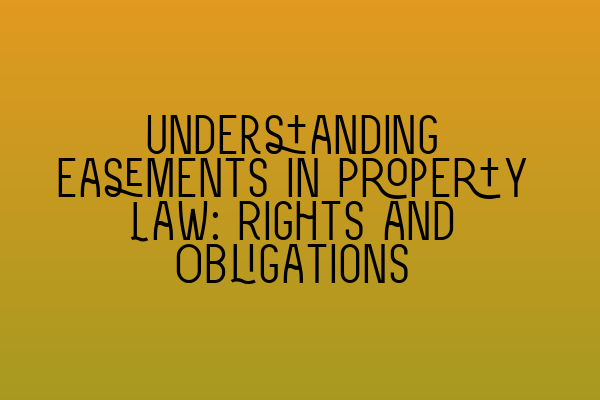Understanding Easements in Property Law: Rights and Obligations
As a property owner or prospective buyer, it is crucial to understand the concept of easements in property law. Easements are rights and obligations that are attached to a property, granting certain privileges or imposing restrictions on the property owner and other parties involved. In this article, we will delve into the details of easements, their types, and the rights and obligations they entail.
What is an Easement?
An easement is a legal right that allows a person or entity to use someone else’s land for a specific purpose, while the ownership of the land remains with the original owner. This right is legally binding and can be permanent or temporary, depending on the terms agreed upon.
There are various types of easements, each serving a different purpose. Some common examples include:
- Right of Way: A right of way easement grants someone the right to pass through another person’s property. This type of easement is commonly seen in shared driveways or pathways between properties. It ensures that the property owner has a legal obligation to allow passage to the person or entity with the right of way.
- Utility Easements: Utility companies often require easements to place and maintain their utilities, such as water, gas, or electricity, on private properties. These easements give utility companies the right to access the property for installation, repairs, or maintenance of their infrastructure.
- Air and Light Easements: Air and light easements are designed to protect a property owner’s right to receive sunlight or maintain a certain level of airflow. These easements prevent neighboring property owners from obstructing the natural flow of light and air to a property.
Understanding the specific type of easement attached to a property is essential, as it determines both the rights of the property owner and the obligations they must fulfill.
Rights and Obligations of Property Owners with Easements
When a property has an easement, the property owner must be aware of their rights and obligations. Let’s explore both sides of the equation:
Rights of Property Owners:
Property owners with easements have the right to:
- Enjoy the majority of their property without any interference from the holder of the easement.
- Retain ownership of the land and use it for any purposes not restricted by the easement.
- Take legal action if the holder of the easement exceeds the agreed-upon rights or fails to fulfill obligations.
It is crucial for property owners to understand and safeguard their rights when dealing with easements.
Obligations of Property Owners:
Property owners with easements have the following obligations:
- Allow the holder of the easement to exercise their rights as agreed upon, such as the right of way or utility access.
- Maintain the easement area in a suitable condition to facilitate the rights granted to the holder.
- Refrain from interfering with or impeding the rights granted to the holder of the easement.
Property owners must fulfill these obligations to avoid potential legal disputes and ensure a harmonious relationship with the holder of the easement.
Key Considerations for Easements
When dealing with easements, there are several important factors to consider:
Documentation and Professional Advice:
Before purchasing a property or granting an easement, it is crucial to review the documentation carefully. Engaging the services of a solicitor experienced in property law can help ensure that the rights and obligations associated with the easement are clearly defined, protecting your interests in the long run.
Furthermore, seeking professional advice ensures that you understand the implications of the easement and can make informed decisions regarding the property.
Property Valuation:
Easements can impact the value of a property. While some easements, like a right-of-way benefiting a property, may increase its value, others, such as an easement restricting development, may have a negative impact. It is advisable to obtain a property valuation taking into account the presence and nature of easements to accurately assess the property’s worth.
Easement Termination:
In certain circumstances, an easement may be terminated or extinguished. This could occur through mutual agreement, abandonment, or changes in the land’s use. Understanding the grounds for termination is essential to protect your property rights and assess its future potential.
To learn more about property law and related topics, we recommend the following articles:
- Updates in UK Property Laws: Key Changes and Implications
- Legal challenges in property transactions: A comprehensive guide
- Navigating Lease Laws in the UK: Essential Guidelines for Tenants and Landlords
- Dominate Property Law Questions: Avoiding Common Pitfalls
- Land Law Revision Tips: Ace Your Exam Preparation
By understanding easements in property law, you can make informed decisions when buying, selling, or managing a property. Remember to consult a professional solicitor for advice tailored to your specific situation, and stay updated with the latest developments in property law.
